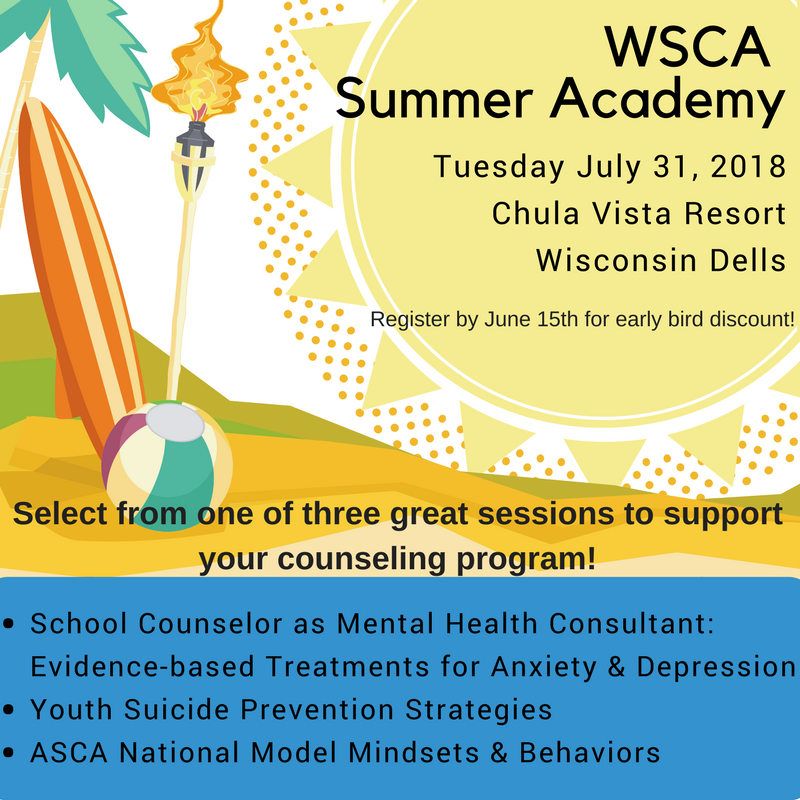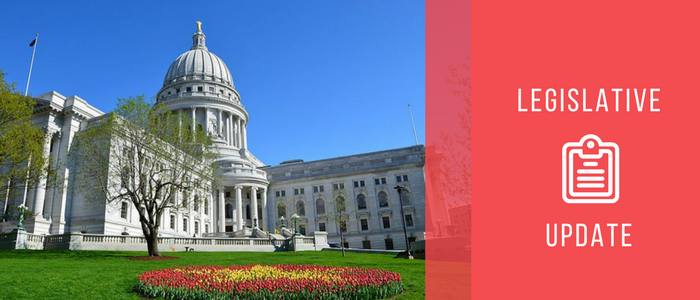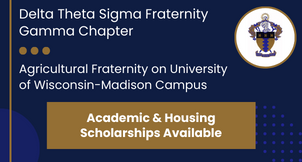June 2018

In This Issue:
Board Chair Message
DPI Consultant Message
A Summer Reading List for School Counselors
Summer Academy
Legislative Update
Counselink
Staff Spotlight
Upcoming Events and Committee Updates
A Message from
Your Board Chair Olin Morrison
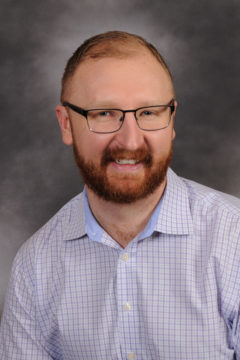
Keep Your Part of the World Going Right
This Spring the Morrison family hit a couple big milestones. We have a graduate, and all of our kids are now in school! Granted, we only have two kids. Edee, our 5 year old, is strong, determined and ridiculously creative. On May 31st, Edee graduated from 4K. The class sang What a Wonderful World, mom and dad cried a little. Then there is Barrett, our 3 year old, who is incredibly loving, curious, and charming. This Fall Barrett will start preschool at the same school Edee went, a wonderful nature-based school called Cove Country School. We celebrated these milestones by spending a long weekend at my parents place in the Northwoods of Wisconsin. The weekend was filled with fishing, hiking, s’mores, parents, grandparents, great grandparents, bedtime stories, swimming, frogging, and the list goes on. There were plenty of shared moments between child and child, child and adult, and child and nature. As I observed and participated in these moments, I couldn’t help but think of the message our Superintendent sent us of into the summer with, “keep your part of the world going right.”
Since I was a little kid, maybe 4 or 5, my mom would share the Serenity Prayer with me and my sister. For those who are not familiar, it goes like this:
God grant me the serenity to accept the things I cannot change,
the courage to change the things I can,
and the wisdom to know the difference.
I have lived the majority of my life with this as a core mantra, and yet I am still imperfect in my adherence to it. Like yoga, it is a practice. Lately, I feel like I am not practicing enough. There are a plethora of things, beyond my control, that are on my mind. From global political issues, to the issues that walk through my office door over the course of the year, to the more trivial Packer’s roster issues. Likely, I am not alone.
Often, when we become ungrounded and spend too much time attempting to control things beyond our scope, we can feel inadequate. And yet, if we allow, the little moments that are right in front of us (the ones we can have control over) can remind us of all the greatness we are a part of. As I watched my kids share who they are with this world, I couldn’t help but feel restored. As counselors, we live in many different worlds, summer is often our time to bring focus back to our own. Take this opportunity and connect with people, with nature, and with yourself. Revel in these moments. We are only able to keep our professional world going right, if we keep our personal world going right.
A Message from Your DPI Consultant,
Gregg Curtis
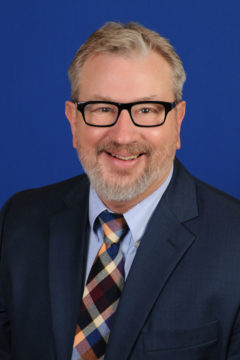
Keeping students healthy, safe, supported, and encouraged is one of the tenets of DPI’s vision for all Wisconsin students to graduate college and career ready. The healthy and safe aspects of these tenets are the focus of three funding possibilities for schools: the School-based Mental Health Services Grant Program, Title IVA of the Every Student Succeeds Act, and the School Safety Grant through the Wisconsin Department of Justice.
Of course, school counselors know that keeping our students safe and healthy means helping them address both externalizing and internalizing behaviors. This summer there is an opportunity to increase your knowledge and learn about resources to help students and staff address a particularly important topic: youth suicide. More specifically, preventing youth suicide.
The full-day workshop will address contextual factors of youth suicide, risk and protective factors, warning signs, and how to effectively respond to suicide ideation. Participants are encouraged to bring their school’s Emergency Operations Management Plan or School Safety Plan to explore how they are to react to a student in a suicidal crisis, a suicide attempt, or a death by suicide.
Of particular interest and emphasis will be:
- DPI’s newly released “Special Topic on Suicide and Help Seeking” which drills down into the 2017 Youth Risk Behavior Survey to explore what’s happening in Wisconsin in relation to youth suicide and possible risk factors.
- The Suicide Prevention Toolkit for High Schools available from the Substance Abuse and Mental Health Services Administration (SAMHSA). This toolkit assists high schools and school districts in designing and implementing strategies to prevent suicide and promote behavioral health. The toolkit includes tools to implement a multifaceted suicide prevention program that responds to the needs and cultures of students.
- After a Suicide: A Toolkit for Schools (2nd ed.) assists schools in implementing a coordinated response to the suicide death of a student. Originally developed in 2011, the second edition includes new information and tools that middle and high schools can use to help the school community cope and reduce suicide risk. The toolkit was developed in collaboration with the American Foundation for Suicide Prevention and in consultation with national experts, including school-based administrators and staff, clinicians, researchers, and crisis response professionals. It is designed primarily for administrators and staff but can also be useful for parents and communities.
- The revised interactive suicide prevention gatekeeper training for staff is another key tool. An important step in protecting all students from the dangers of suicide is the ability to understand the context of youth suicide in Wisconsin, recognize the warning signs of suicide ideation, and take appropriate steps to keep a suicidal student safe.
These resources and others will be a part of the day’s training. Please accept my best wishes for a smooth ending to the school year, and I look forward to seeing many of you at the Chula Vista Resort on July 31.
A Summer Reading List for School Counselors
By Erica Kruger, Madison Metropolitan School District
As I wrote this, it was a rainy and cold March day in Madison, Wisconsin; not unlike many March days this year. Even so, the feel of spring was in the air and with it, the anticipation of summer days not-too-far after that. For me, after bare feet, garden time and slow mornings, the best part of summer is the space that it provides for professional reading and reflection. During the school year, on the back flap of my journal, I generate a summer reading list; inspired by recommendations from colleagues, references from professional development courses, and ideas from newspaper and magazine articles. Each summer the areas of focus vary but tend to fall into a few key categories, including organizational culture/systems thinking, mindfulness, child and adolescent development, and school counseling practices.
Perhaps professional reading is also an integral part of your summertime rejuvenation plan. If so, in the spirit of collaborative learning, I’ve offered a few suggestions: This list begins with a few personal favorites (that I’ve read in past summers) with a bit of information on each, and concludes with the ever-growing list of my intended reads for this summer.
Recommended Reads:
Organizational Culture & Systems:
The OIQ Factor: Raising your school’s organizational intelligence (William Powell and Ochan Kusuma-Powell, 2013). Designed for teachers and school leaders, this book explores strategies designed to raise the organizational intelligence of classrooms and schools. The authors emphasize the key role that strong collaborative practices play in creating positive school change. As they note, “simplistic and superficial approaches to improving student learning simply don’t work because school improvement isn’t a technical challenge; it is an adaptive one. It requires a change not just in behaviors and skill, but in values, beliefs and even identity.” (p. 7) Rich with case studies and discussion questions, this book offers fascinating ideas to inform how we might support culture and climate work in our schools and school districts.
Deep Work: Rules for Focused Success in a Distracted World (Cal Newport, 2016). If you, like me, wonder how you sometimes feel so busy and yet seem unable to get certain kinds of work accomplished, this book may offer some answers. The author defines “deep work,” as “professional activities performed in a state of distraction-free concentration that push your cognitive capabilities to their limit,” and suggests that the development of transformative, high-quality ideas require deep work, (p.3). Though some of the concepts may seem better suited for individuals with more control over their schedules than we typically have in schools, this book offers a valuable opportunity to reflect on how you might influence your work environment and adjust your work habits to support you in navigating the dynamics of our distraction-rich school settings.
Collective Genius: The Art and Practice of Leading Innovation (Linda A. Hill, Greg Brandeau, Emily Truelove & Kent Lineback, 2014). Designed for a broad audience, this book draws on authentic examples from a variety of organizations to explore the leader’s role in supporting innovative practices. Their finding? Effective leaders of innovation don’t try to control the vision and master plan. Instead, “a leader of innovation creates a place – a context, an environment – where people are willing and able to do the hard work that innovative problem solving requires.” (p.3). True leaders of innovation recognize that it is a collective, collaborative endeavor and work hard to foster the norms and establish the structures that support effective collaboration. Though the examples are largely from the world of business, I found the ideas transferrable for educational systems, as well. In addition, it inspired thinking about how district leaders might better support a culture of innovation for school staff and how school teams might better foster innovative thinking on the part of their students.
Mindfulness:
Real Happiness at Work: Meditations for Accomplishment, Achievement, and Peace (Sharon Salzberg, 2014). In her introduction, Salzberg provides an insightful exploration of the way in which a personal mindfulness practice can support us in becoming “more productive, satisfied, and peaceful at work.” (p. 2) She frames her book around “eight pillars of happiness in the workplace” – balance, concentration, compassion, resilience, communication and connection, integrity, meaning, and open awareness (p.5). Each chapter explores a concept in detail and then closes with specific meditation practices designed to support the specific pillar described therein. Our district has been using this text in several professional learning offerings and it has inspired great dialogue about the necessity, (and challenge), of personal self-care practice given the current culture and climate that many of our staff experience in their schools.
Wherever You Go There You Are: Mindfulness Meditation in Everyday Life (Jon Kabat-Zinn, 1994). If you have been curious about the world of mindfulness meditation, this text offers the starting place. Kabat-Zinn is the founder of Mindfulness Based Stress Reduction (MBSR), a program that worked to apply the practices of mindfulness meditation into everyday living to support management of stress, pain, and illness. Crafted as short chapters on specific concepts – Stopping, Waking Up, Concentration, Harmony – and interwoven with poetry, this book offers a gentle entry into exploring what it might be to practice being present, in the present moment, with full awareness and non-judgement. Kabat-Zinn also provides scaffolds for a variety of meditation practices – sitting, movement, breath – and also offers reflections on the ways in which mindfulness practices can be integrated into the everyday moments of life, potentially shifting both how we experience, and react to, what life presents.
Building Emotional Intelligence : Techniques to Cultivate Inner Strength in Children (Linda Lantieri & Daniel Goleman, 2008). The bulk of the book is organized around three separate chapters that offer age-appropriate (i.e., 5-7 years old, 8-11 years old and 12+ years), approaches to body relaxation and mindfulness. The key ideas being that if we can quiet and focus the mind and calm and relax the body, we can manage emotions more effectively and foster a deeper sense of inner resilience. This book includes a CD with guided contemplative practice and could be a powerful addition to small group or individual work, especially with students experiencing a strong stress response or that tend to get caught up in their thoughts in a way that causes a lot of agitation or distress.
Culturally Responsive Practice in Education:
Culturally Responsive Teaching & The Brain: Promoting Authentic Engagement and Rigor Among Culturally and Linguistically Diverse Students (Zaretta Hammond, 2015). Many of our district and school-based leadership teams have been using this text as a common read this year to engage in critical conversations about the ways in which our district succeeds – and falls short – of fully engaging all of our student community. This text is very comprehensive, practical, and engaging: It supports a deeper understanding of the neuroscience behind culturally responsive practice and provides both principles and specific strategies to support teachers (and school counselors) in creating effective learning environments for all students. A key focus area is the important role that authentic, trusting relationships play in helping students to become independent learners through the development of certain academic mindsets and habits. In addition, the author engages readers in a thoughtful exploration of their own cultural identity, emphasizing that self-examination is a critical foundational component to serving as a culturally responsive practitioner. A great read for an individual but perhaps even better as a school team.
Ready, willing, and able: A Developmental Approach to College Access and Success (Mandy Savitz-Romer and Suzanne M. Bouffard, 2012). An excellent read for school counselors, especially those working at the secondary level, this text explores the critical interplay between adolescent development, educational equity (or lack thereof), and post-secondary planning programming. The authors posit that, despite best intentions, all of our college and career exploration and planning intentions may miss the mark, if we aren’t aware of how adolescent development and nuances of that developmental process for our culturally diverse youth populations, impact students’ post-secondary beliefs and aspirations. A blend of exploration of ideas and concrete recommendations, this book offers a valuable lens through which to review, assess and refine the current college and career components of your comprehensive school counseling program.
On My List for This Summer:
Effective Communication & Teaming
- Difficult Conversations: How to Discuss What Matters Most (Douglas Stone, Bruce Patton, & Sheila Heen, 1999)
- Crucial Conversations: Tools for Talking When Stakes are High (Kerry Patterson, Joseph Grenny, Ron McMillan, & Al Switzler, 2012)
- Thanks for the Feedback (Douglas Stone & Sheila Heen, 2014)
- Lost at School: Why Our Kids with Behavioral Challenges Are Falling Through the Cracks and How We Can Help Them (Ross Greene, Ph.D., 2008)
- The Behavior Code: A Practical Guide to Understanding and Teaching the Most Challenging Students (Jessica Minahan & Nancy Rappaport, MD, 2017)
- The Sensory Child Gets Organized: Proven Systems for Rigid, Anxious, or Distracted Kids (Carolyn Dalgliesh, 2013)
- Hardwiring Happiness (Rick Hanson, 2013)
- The Way of Mindful Education: Cultivating Well-Being in Teachers and Students (Daniel Rechtshaffen, 2014)
- Happy Teachers Change the World: A Guide for Cultivating Mindfulness in Education (Thich Nhat Hanh, 2017)
- Make Me: Understanding & Engaging Student Resistance in School (Eric Toshalis, 2015)
- The Little Book of Restorative Justice in Education: Fostering Responsibility, Hope & Healing in Schools (Katherine Evans & Dorothy Vandering, 2016)
- Teaching to Transgress: Education as the Practice of Freedom (bell hooks, 1994)
- For White Folks Who Teach in the Hood…and the Rest of Ya’ll Too: Reality Pedagogy and Urban Education (Christopher Emdin, 2016)
ASCA Position Statement on Annual Performance Evaluations
Please join ASCA and more than 60 organizations that make up the Title IV-A Coalition for our National Day of Action!
Join us on Wednesday June 13th for a National Day of Action to advocate for full funding of the Title IV-A Student Support and Academic Enrichment (SSAE) grant program. This federal grant, part of the Every Student Succeeds Act (ESSA) will allow schools and districts to support well-rounded programs, safe and healthy schools, and the effective use of technology. This program has significant funding opportunities for school counseling services.
Congress recognized the importance of this block grant and provided $1.1 billion for Title VI-A in Fiscal Year 2018. At this funding level many districts will receive enough funds and have the flexibility to make meaningful investments in necessary program areas. We need to keep this momentum up, and show our continued support for Title IV-A and ask Congress to continue to invest in this program.
What can you do?
Starting on June 13th, we ask that you please join educators and advocates all across the nation by contacting your member of Congress by using our easy advocacy tool. You will be able to send an email or contact your elected official via social media – or both! The advocacy campaign will close on June 18th.
https://www.votervoice.net/ASCA/campaigns/54233/respond
Read the Current Issue of Counselink Here

I recently moved from Arizona and was very involved with AzSCA. I served as President of that organization a few years ago and believe in the work of our school counseling organizations. The professional relationships I have built through my involvement in these organizations has been invaluable to me and my career. I am a staunch advocate for school counseling programming and wanted to be a part of WSCA to help spread about the ways in which SCHOOL COUNSELORS change lives!What do you hope to accomplish through your role in WSCA?
I hope to help key stakeholders like legislatures, administrators, parents, students and our colleagues understand that we are no longer guidance counselors focused solely on changing schedules and postsecondary planning with some students, that we are SCHOOL COUNSELORS who provide data driven programs for ALL students focused on their academic, social/emotional and career development.What do you love about your work?
I love that I get to work with 45 fabulous counselors in the Madison Metro School District every day. I love their passion and dedication to our students and love that they are advocating, collaborating, communicating and creating systemic change for kids all the time!Why did you decide to become an educator?
I become an educator to help students overcome barriers to their learning. I considered working in juvenile detention but after a summer internship realized that these kids needed PREVENTION not just crisis response. Comprehensive school counseling programs are designed by their very nature to find these kids that need our programming and support before the kids (or admin, or the police etc) come to us! Given the freedom to work run a comprehensive data-driven program in our schools, school counselors can make all the difference in a student’s life.What do you enjoy doing when you’re not at school?Chasing my three young boys! I am currently reading The Boy Without Instructions.
Professional Recognition Committee
Friend of School Counseling: This award recognizes a person who, through leadership, acts, or support, has made contributions to the school counseling profession.
Nikki Kiss
Mary Gehrke-McAllister Leadership Award: This award recognizes a person who provides outstanding leadership to the school counseling profession in Wisconsin.
Steve Schneider
Supervisor/Administrator: This award recognizes a supervisor or administrator who has made significant contributions to the field of school counseling.
Scott Bartol
School Counseling Team: This award recognizes a school counseling team that works together to go above and beyond to meet the personal, career, and academic needs of their students.
Oshkosh North High School
Secretary: This award recognizes a secretary or admin assistant who supports and enhances the work of the school counselor.
Annette Marciniak
Conference Committee
Don’t miss out on next year’s amazing professional development opportunity!
Be sure to SAVE THE DATE for the 2019 WSCA Annual Conference:
TUESDAY, FEBRUARY 5 – THURSDAY, FEBRUARY 7, 2019
WSCA’s 54th Annual State Conference
The Power of Hope
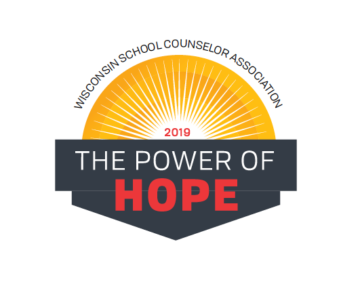 Monona Terrace Community & Convention Center
Monona Terrace Community & Convention Center
Madison, Wisconsin
The 2019 conference will bring you three days of dynamic professional development and will feature two fantastic keynote speakers:
Kevin J. Fleming, Ph.D. Producer of the viral animation video “Success in the New Economy,” and author of the bestseller, “(Re)Defining the Goal”.
Karen Gannon Griffith, PhD, LPC, elementary teacher, special education teacher, and a professional school counselor.
Want to be more than just an attendee at the WSCA Conference? Consider sharing your expertise on a hot topic in school counseling by presenting a preconference workshop or hour-long sectional. WSCA Coordinators are currently seeking applicants for the following presentation sessions:
- The Search for 2019 Sectional Presenters is on! The heart of all WSCA Conferences will always be the sharing of material from school counselors in the trenches. Share your latest and greatest practices and ideas at the 2019 WSCA Conference by doing a one-hour sectional. Sectional Proposal Forms are now available and can be found HERE. The deadline for sectional proposals is November 10, 2018.
Criteria used for review and selection of program proposal will be based on timeliness of topic, interest in the topic, clarity of organization of the proposal form and geographic representation. Diverse and innovative programs are encouraged. Programs will be chosen that meet the needs of all levels of school counselors and other professionals and individuals interested in counseling.
Note: Presentations encouraging the purchase of books, materials or services will not be accepted.
Publications Committee Update
Are you interested in helping with WSCAlink?
Here are two ways to get involved:
- Submit an article! Anyone can write for our Tips for Best Practice section. Articles should be no more than 500 words and offer practical ideas that can be implemented right away. Past topics include a small-group that worked well, a great classroom management strategy, an enjoyable mindfulness technique, and more.
- Join the Editing Team! Do you have a penchant for pronouns? Do you leap for language? Do you delight in descriptions? If so, we would love for you to join the Publications Committee! Responsibilities include editing 2-3 WSCAlink issues per year. Contact us if you jump for jargon!
Send questions/articles to publications@wscaweb.org and then we will let you know when it will be used. Don’t be afraid, be published!
All submissions are due by the 15th of each month to publications@wscaweb.org
Upcoming topics and suggestions for articles include:
July: Recharge Your Own Practice
August: Using Data to Your Advantage



